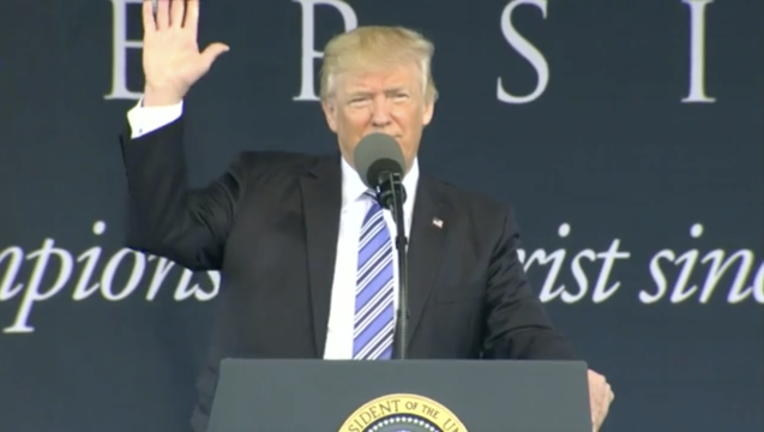Trump urges Liberty University grads to stand up to criticism

LYNCHBURG, Va. (AP) - Delivering his first commencement address, President Donald Trump on Saturday urged graduates of a Christian university to follow their convictions but to also be willing to stand up to criticism from others who don't have the courage to do what is right.
Trump kept to an upbeat message in his first extended public appearance since firing James Comey as FBI director this week, saying the lawyer and veteran prosecutor was an incompetent "showboat" and "grandstander."
The timing of Comey's dismissal raised questions about Trump's decision, as the FBI continues its investigation into Russia's role in the 2016 presidential campaign that ended with Trump's election.
Trump didn't mention the fallout over Comey's firing in his remarks to graduates of Liberty University, a Christian school whose leader was one of Trump's earliest and most outspoken supporters during the campaign.
Drawing parallels to what was widely viewed as a longshot bid by Trump for the presidency, he urged the more than 18,000 graduates to fight for what they believe in and to "challenge entrenched interests and failed power structures." A crowd of more than double that size filled an outdoor stadium on campus to welcome just the second sitting president to address the university's commencement.
"Remember this: Nothing worth doing ever, ever, ever came easy," Trump said. "Following your convictions means you must be willing to face criticism from those who lack the same courage to do what is right, and they know what is right but they don't have the courage or the guts or the stamina to take it and to do it."
Trump told graduates to "treat the word 'impossible' as nothing more than motivation" and to embrace being called an "outsider" because "It's the outsiders who change the world."
"The more that a broken system tells you that you're wrong, the more certain you must be that you must keep pushing ahead," added Trump, who often complains about being underestimated during the presidential campaign.
Trump, who took office on Jan. 20, also sounded familiar campaign themes about a broken system in Washington.
"In my short time in Washington, I've seen first-hand how the system is broken," he said. "A small group of failed voices who think they know everything and understand everyone, want to tell everyone else what to do and how to live and what to think. But you aren't going to let other people tell you what to believe, especially when you know that you're right."
"We don't need a lecture from Washington, D.C., on how to lead our lives," Trump said.
Jerry Falwell Jr., Liberty's president, helped Trump win an overwhelming 80 percent of the white evangelical vote.
A recent Pew Research Center survey marking Trump's first 100 days in office, a milestone reached on April 29, found three-quarters of white evangelicals approved of his performance as president while just 39 percent of the general public held the same view.
Christian conservatives have been overjoyed by Trump's appointment of Justice Neil Gorsuch to the Supreme Court, along with Trump's choice of socially conservative Cabinet members and other officials, such as Charmaine Yoest, a prominent anti-abortion activist named to the Department of Health and Human Services.
But they had a mixed response to an executive order on religious liberty that Trump signed last week. He directed the IRS to ease up on enforcing an already rarely enforced limit on partisan political activity by churches.
He also promised "regulatory relief" for those who object on religious grounds to the birth control coverage requirement in the Affordable Care Act health law. Yet the order did not address one of the most pressing demands from religious conservatives: broad exemptions from recognizing same-sex marriage.
Still, Falwell, who endorsed Trump in January 2016 just before that year's Iowa caucuses, praised Trump's actions on issues that concern Christian conservatives.
"I really don't think any other president has done more for evangelicals and the faith community in four months than President Trump has," Falwell told The Associated Press in a telephone interview on Friday.
Falwell became a key surrogate and validator for the thrice-married Trump during the campaign, frequently traveling with Trump on the candidate's plane and appearing at events. Falwell often compared Trump to his later father, the conservative televangelist Jerry Falwell, and argued that while Trump wasn't the most religious candidate in the race, he was the man the country needed.
Trump has spoken at Liberty University before. He courted Christians there in January 2016 with a speech that drew laughs from some in the audience when referred to one of the Bible's books as "Two Corinthians" instead of the more common "Second Corinthians." In that speech, Trump promised: "We're going to protect Christianity, and I can say that. I don't have to be politically correct."

